高中英语语法---条件状语从句讲解
英语语法讲解之条件状语从句

英语-条件状语从句定义:条件状语从句是表示主句动作发生的前提或条件的从句。
条件状语从句分为真实条件状语从句和非真实条件状语从句。
引导条件状语从句的有if,unless,so / as long as,as / so far as,on condition that,in case,suppose,supposing 等。
条件状语从句中的谓语动词一般要用现在时或过去时代替一般将来时或过去将来时。
知识梳理:初中学习到的引导条件状语从句的连接词主要有:if(如果)、unless(除非)或as long as(只要) 等。
unless 在意思上等于if...not。
一、条件状语从句用法1、引导条件状语从句最常用的连词是if,由if 引导的条件状语从句表示在某种条件下某事很可能发生。
如:If you ask him, he will help you.如果你请他帮忙,他会帮你的。
If you fail in the exam, you will let him down.如果你考试不及格,你会让他失望的。
另外,if 从句还表示不可实现的条件或根本不可能存在的条件,也就是一种虚拟的条件或假设,从句多用一般过去时或过去完成时。
如: If I were you, I would invite him to the party.如果我是你,我会邀请他参加聚会。
2、unless = if...not. 除非,若不,除非在……的时候Let's go out for a walk unless you are too tired.=If you are not too tired, let's go out for a walk.Unless it rains, the game will be played.除非下雨,比赛将照常进行。
3、so/as long as 只要You may borrow my book as long as you keep it clean.只要你保持书的清洁,你就可以把我的书借去。
高中英语条件状语从句的句型
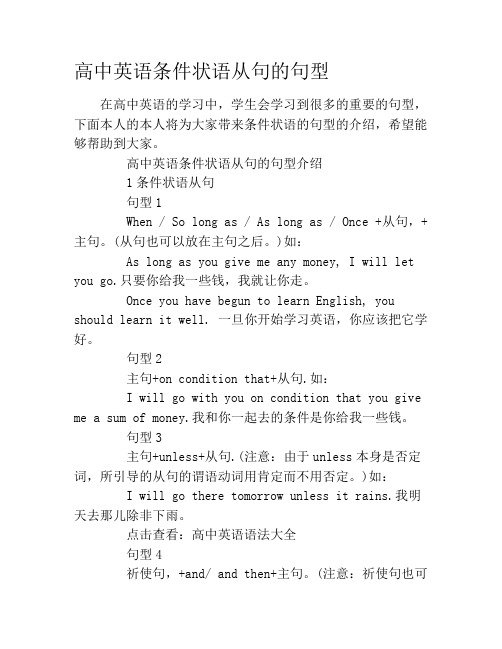
高中英语条件状语从句的句型在高中英语的学习中,学生会学习到很多的重要的句型,下面本人的本人将为大家带来条件状语的句型的介绍,希望能够帮助到大家。
高中英语条件状语从句的句型介绍1条件状语从句句型1When / So long as / As long as / Once +从句,+主句。
(从句也可以放在主句之后。
)如:As long as you give me any money, I will let you go.只要你给我一些钱,我就让你走。
Once you have begun to learn English, you should learn it well. 一旦你开始学习英语,你应该把它学好。
句型2主句+on condition that+从句.如:I will go with you on condition that you give me a sum of money.我和你一起去的条件是你给我一些钱。
句型3主句+unless+从句.(注意:由于unless本身是否定词,所引导的从句的谓语动词用肯定而不用否定。
)如:I will go there tomorrow unless it rains.我明天去那儿除非下雨。
点击查看:高中英语语法大全句型4祈使句,+and/ and then+主句。
(注意:祈使句也可用一个名词短语。
)如:Use your head, and you will find a good idea.动脑筋想一想,你就会想出一个好主意。
Another word, and I will beat you.你再说一句,我就揍你。
句型5If +necessary / impossible/ important等,+主句.(注意:if与形容词之间的it is被省略。
)如:If necessary, I will do it. 如果有必要的话,我来做此事。
2原因状语从句句型1主句+in case+从句.(in case表示以免)如:I will take my raincoat in case it rains.我要把雨衣带上以免下雨。
高考英语 重难点语法讲解-状语从句

状语从句1.引导状语从句的连词时间状语从句when(as、while)(当……时候)、since(自从)、before(在……之前)、after(在……之后)、until(till)(直到……才)、whenever(每当)、once (一旦)、every time(每当)、the day(在……那天)、as soon as(一……就)、hardly(scarcely)……when(一……就)、no sooner……than(一……就)、instantly(immediately、directly)(一……就)、the moment(minute、second、instant)(一……就)地点状语从句where(在……地方)、wherever(在任何地方)、every where(在每个地方)原因状语从句because(as、for)(因为)、since(既然)、when(既然)、now(that)(既然)、in that(因为、既然)条件状语从句if(如果)、unless(除非)、as(so)long as(只要)、providing (provided)(that)(假如)、suppose(supposing)(that)(假如)、in case(如果)、only if(如果)、if only(但愿、如果……就好了)、on condition that(条件是)让步状语从句though(although)(虽然)、even if(even though)(即使)、while(虽然、尽管)、whatever(no matter what)(无论如何)、whenever(no matter when)(无论何时)、wherever(no matter where)(无论哪里)、whoever(no matter who)(无论谁)、however(no matter how)(无论怎样)、for all(that)(尽管)、granting(granted) that(即使)、whether……or(不论……还是)、in spite of (despite)the fact that(不管)结果状语从句so that(so、that)(结果)、so(such)……that(如此……以至于)、but that(but)(要不是)目的状语从句so that(so、that)(为了、以使)、lest(以防)、in case(以防、以免)、for fear that(以防)、in order that(为了)比较状语从句than(比……)、as……as(像……一样)、not so(as)……as (不像……一样)、(not)the same as((不)同……一样)、not so as(不如)、(not)such……as((不)如……)方式状语从句as(像……、犹如……)、as if(as though)(好像、仿佛)、the way(……的样子)2、时间状语从句(表示时间的状语从句)①when、whenever、while和aswhen意为“当……时候”,表示某个具体的时间。
【语法讲解】高中英语--状语从句专题讲解(详细)

主句如果是否定句,则此时主句谓语动词用非延续性动词,表示主句的动作从从句表示的时间点才开始,即“直到…才…”
Ididn’t knowanything about it until you told me(否定句,谓语为非延续性动词)
2)主句是肯定句时
主句如果是肯定句,则此时主句谓语动词用延续性动词,表示主句的动作直到从句表示的时间点就结束,即“直到…为止”。
No sooner had he reached home than it began to rain.
= He had no sooner reached home than it began to rain.
Hardly had I told him the news when he stopped listening.
=I hardly told him the news when he stopped listening.
地点状语从句
地点状语从句的引导词有when和wherever。
where, wherever指具体地点时,从句可用于主句之前或之后;
where, wherever表示抽象概念的含义时,从句需放在主句前。
While wewere waiting forthe bus, it was raining heavily.(延续性)
while和as常表示从句的动作与主句的动作同时发生,而when表示从句的动作发生在主句动作之前、之后,也可同时发生。
Theyrushed inwhile/as wewere discussingproblems.(同时发生)
2)从句谓语动词不同,表达的意义不同。
since引导的从句谓语如果是延续性动词或表示状态的动词,则从句表示的时间是从该动作或状态结束时算起。
条件状语从句用法
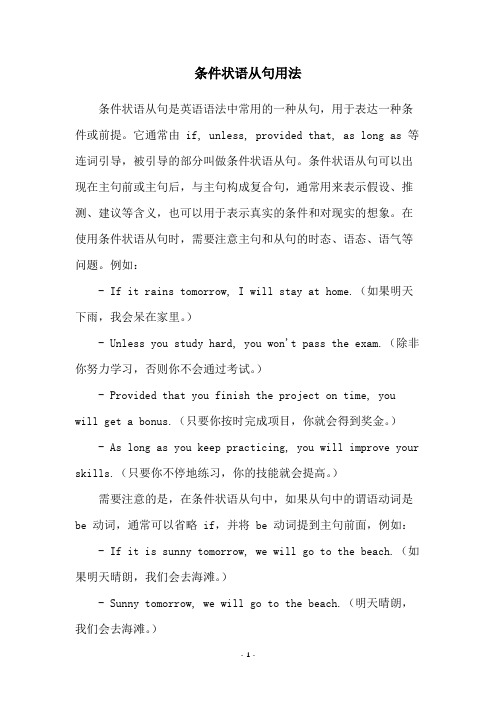
条件状语从句用法条件状语从句是英语语法中常用的一种从句,用于表达一种条件或前提。
它通常由 if, unless, provided that, as long as 等连词引导,被引导的部分叫做条件状语从句。
条件状语从句可以出现在主句前或主句后,与主句构成复合句,通常用来表示假设、推测、建议等含义,也可以用于表示真实的条件和对现实的想象。
在使用条件状语从句时,需要注意主句和从句的时态、语态、语气等问题。
例如:- If it rains tomorrow, I will stay at home.(如果明天下雨,我会呆在家里。
)- Unless you study hard, you won't pass the exam.(除非你努力学习,否则你不会通过考试。
)- Provided that you finish the project on time, youwill get a bonus.(只要你按时完成项目,你就会得到奖金。
)- As long as you keep practicing, you will improve your skills.(只要你不停地练习,你的技能就会提高。
)需要注意的是,在条件状语从句中,如果从句中的谓语动词是be 动词,通常可以省略 if,并将 be 动词提到主句前面,例如: - If it is sunny tomorrow, we will go to the beach.(如果明天晴朗,我们会去海滩。
)- Sunny tomorrow, we will go to the beach.(明天晴朗,我们会去海滩。
)但是,这种省略 if 的用法通常只适用于口语,不建议在正式的写作中使用。
高考英语语法复习系列讲座-状语从句
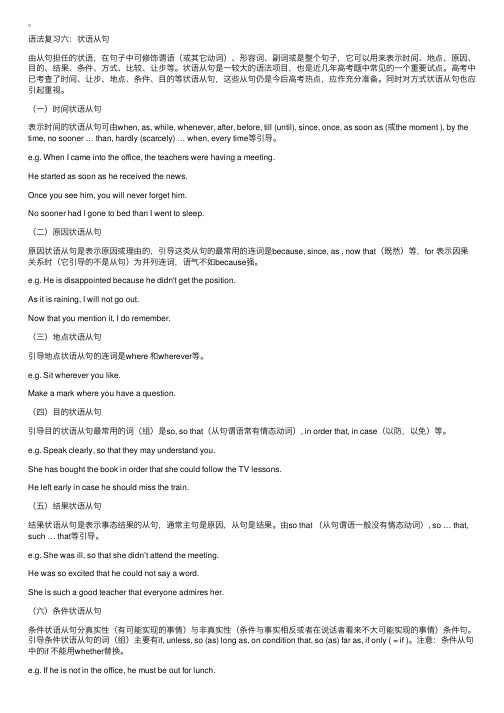
语法复习六:状语从句由从句担任的状语,在句⼦中可修饰谓语(或其它动词)、形容词、副词或是整个句⼦,它可以⽤来表⽰时间、地点、原因、⽬的、结果、条件、⽅式、⽐较、让步等。
状语从句是⼀较⼤的语法项⽬,也是近⼏年⾼考题中常见的⼀个重要试点。
⾼考中已考查了时间、让步、地点、条件、⽬的等状语从句,这些从句仍是今后⾼考热点,应作充分准备。
同时对⽅式状语从句也应引起重视。
(⼀)时间状语从句表⽰时间的状语从句可由when, as, while, whenever, after, before, till (until), since, once, as soon as (或the moment ), by the time, no sooner … than, hardly (scarcely) … when, every time等引导。
e.g. When I came into the office, the teachers were having a meeting.He started as soon as he received the news.Once you see him, you will never forget him.No sooner had I gone to bed than I went to sleep.(⼆)原因状语从句原因状语从句是表⽰原因或理由的,引导这类从句的最常⽤的连词是because, since, as , now that(既然)等,for 表⽰因果关系时(它引导的不是从句)为并列连词,语⽓不如because强。
e.g. He is disappointed because he didn't get the position.As it is raining, I will not go out.Now that you mention it, I do remember.(三)地点状语从句引导地点状语从句的连词是where 和wherever等。
高中英语语法:状语从句知识点
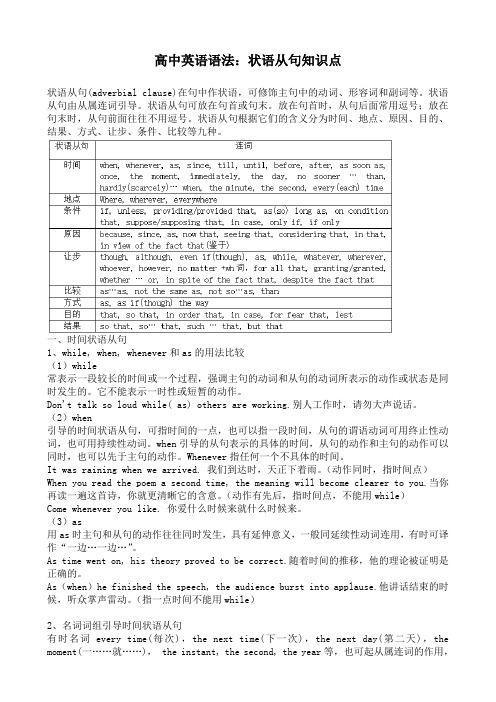
高中英语语法:状语从句知识点状语从句(adverbial clause)在句中作状语,可修饰主句中的动词、形容词和副词等。
状语从句由从属连词引导。
状语从句可放在句首或句末。
放在句首时,从句后面常用逗号;放在句末时,从句前面往往不用逗号。
状语从句根据它们的含义分为时间、地点、原因、目的、结果、方式、让步、条件、比较等九种。
一、时间状语从句1、while, when, whenever和as的用法比较(1)while常表示一段较长的时间或一个过程,强调主句的动词和从句的动词所表示的动作或状态是同时发生的。
它不能表示一时性或短暂的动作。
Don't talk so loud while( as) others are working.别人工作时,请勿大声说话。
(2)when引导的时间状语从句,可指时间的一点,也可以指一段时间,从句的谓语动词可用终止性动词,也可用持续性动词。
when引导的从句表示的具体的时间,从句的动作和主句的动作可以同时,也可以先于主句的动作。
Whenever指任何一个不具体的时间。
It was raining when we arrived. 我们到达时,天正下着雨。
(动作同时,指时间点)When you read the poem a second time, the meaning will become clearer to you.当你再读一遍这首诗,你就更清晰它的含意。
(动作有先后,指时间点,不能用while)Come whenever you like. 你爱什么时候来就什么时候来。
(3)as用as时主句和从句的动作往往同时发生,具有延伸意义,一般同延续性动词连用,有时可译作“一边…一边…”。
As time went on, his theory proved to be correct.随着时间的推移,他的理论被证明是正确的。
As(when)he finished the speech, the audience burst into applause.他讲话结束的时候,听众掌声雷动。
英语语法-条件状语从句
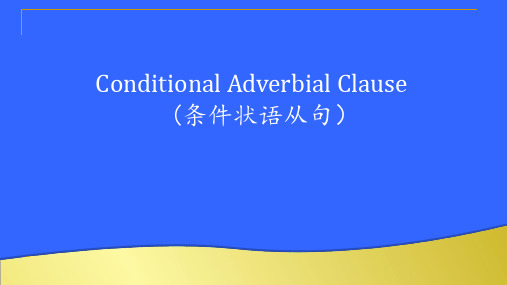
Summary:
1.条件状语从句的定义 “主将从现”
2.条件状语从句注意问题
“主祈从现” “主情从现”
3.其他的引导条件状语从句的引导词
unless,in case, as/so long as, on condition,
provided, suppose
That’s all! Thank you.
I can tell you the truth on condition that you promise to keep a secret.
5. supposing conj.如果,假如,表示一种假 设的条件,常位于句首
Supposing it rains,shall we continue the sports meeting?
3. To learn the conjunctions that Conditional Adverbial Clause obtains
If you're happy ,what will you do ?
If I am happy, I will smile.
一、条件状语从句的定义
if “如果,假如”, 它引导的句子表示某事发生 所需要的条件,即“在……条件下,某事才能发 生,”在句子中充当状语,因此称之为条件状语从 句。
1. Don’t promise anything _u_n_le_s_s_ you are one hundred percent sure.
2. _If_ he thought he could escape
attention by sitting at the back, he was wrong. 3. _O_n_c_e__ you lose heart, you will fail in the exam. 4. If he _d_o_e_sn_’_t_c_o_m_e_(not come)on time, we will go without him. 5. If you help me, I _w_i_ll_f_in_i_sh_(finish) my task on time.
- 1、下载文档前请自行甄别文档内容的完整性,平台不提供额外的编辑、内容补充、找答案等附加服务。
- 2、"仅部分预览"的文档,不可在线预览部分如存在完整性等问题,可反馈申请退款(可完整预览的文档不适用该条件!)。
- 3、如文档侵犯您的权益,请联系客服反馈,我们会尽快为您处理(人工客服工作时间:9:00-18:30)。
条件状语从句
概念定义
由引导词if或unless引导的状语从句叫做条件状语从句。
在英文中,条件是指某一件事情实现之后(状语从句中的动作),其它事情(主句中的动作)才能发生,通常译作“假如”。
(注意:在含有条件状语从句的复合句中,表示将来时态,主句是一般将来时态,祈使句或情态动词,从句要用现在时态,[主将从现原则](主将从现,将并非指将来时,还指表示将来含义的,跟着if后的那句话是从句。
)
类型
条件状语从句
语法引导条件状语从句最常用的连词是if,由if引导的条件状语从句表示在某种条件下某事很可能发生。
如:
1) If you ask him,he will help you.
如果你请他帮忙,他会帮你的。
2) If you fail in the exam,you will let him down.
如果你考试不及格,你会让他失望的
if引导的条件状语从句既可以将从句放前面也可以将从句放后面
(如果天下雨,我们就不玩了)If it rains,we will stop playing.‘
转为We will stop playing if it rains.
if引导的条件状语从句
另外,if从句还表示不可实现的条件或根本不可能存在的条件,也就是一种虚拟的条件或假设,从句多用一般过去时或过去完成时。
如:If I were you,I would invite him to the party.如果我是你,我会邀请他参加聚会。
I would have arrived much earlier if I had not been caught in the traffic.如果没有堵车,我会到的早一点儿。
那么,除了if之外,是否还有其他连词也可以引导条件状语从句呢?回答是肯定的,不仅有,还有很多。
这些词由于出现的频率较小,且用法较复杂一些,所以不如if为大家所熟知罢了。
下面就这些词的用法以例句的形式进行一下简单总结。
1、unless conj.除非,若不,除非在……的时候
You will fail to arrive there in time unless you start earlier.如果你不早点动身,你就不能及时赶到那儿。
Unless it rains,the game will be played.除非下雨,比赛将照常进行。
2、on condition(that)...在……条件下,如果 on condition (that)...引导的条件从句是主句事件发生的前提条件或唯一条件。
I can tell you the truth on condition that you promise to keep a secret.我可以告诉你真相,条件是你答应保密。
You can go swimming on condition (that) you don't go too far from the river bank.你只有在不远离河岸的条件下才可以下水游泳。
3、supposing conj.如果,假如 supposing引导的条件从句表示一种假设条件。
Supposing it rains,shall we continue the sports meeting?倘若下雨,我们的运动会还要继续举行吗?
Supposing anything should go wrong,what would you do then?假如出了什么问题,你准备怎么对付?
4、provided conj.假如,除非,以……为条件 provided (that) +从句表示一种假设条件。
He will sign the contract provided we offer more favorable terms.如果我们提出更优惠的条件,他就会在合同上签字。
He won't be against us in the meeting provided that we ask for his advice in advance.如果我们提前征求一下他的意见,他就不会在会上反对我们。
从上述例句可以看出if,unless,on condition (that),supposing,provided等词引导的条件状语从句,主从句条件关系分明,结构清晰。
但有些句子,虽没有含条件关系的连词,却也隐含着条件关系,这些句子常用一些词,如but for,without等引出一个介词结构来表示条件,条件应该是虚拟的,或与事实相反的假设。
如:but for若非,要不是
But for the rain,we should have a pleasant journey.
要不是下雨,我们的旅行肯定会很愉快。
But for your help,we should not have finished in time.
要不是你帮忙,我们肯定不能及时完成任务
经典语句:If it dosen't rain tomorrow,we will go to the zoo.
If you open the door,i will come in.
条件状语从句就是用以表示“在某种条件下,会……”常用if,in case,on condition等词来引导
连接词主要有 if,unless,as/so long as,on condition
that,provided,suppose,supposing 等..
主句用一般将来时,if或unless引导的条件状语从句用一般现在时。
【注:在条件状语从句中,绝大数情况下some要变为any。
】
条件状语用法
unless = if...not.
e.g. Let's go out for a walk unless you are too tired.
If you are not too tired,let's go out for a walk.
if 引导的条件句有真实条件句和非真实条件句两种:
真实条件句
如:If it rains tomorrow,we won’t go on a park
非真实条件句是虚拟语气的一种,表示与事实相反,如:
If I were you,I would go with him.
so/as long as只要
由as (so) long as,in case引导。
So long as you’re happy,it doesn’t matter what you do.
只要你高兴,你做什么都没有关系。
You may borrow my book as long as you keep it clean.
只要你保持书的清洁,你就可以把我的书借去。
Take your umbrella in case it rains.
带着你的伞吧,以防下雨。
例句
引导条件状语从句的连词有:if(如果),unless(除非;如果不),as long as (除非;只要),supposing(假设),on condition that(条件是),in case (如果)。
【例】
You can't learn English well unless you work hard.
除非你努力学习,否则你学不好英语。
You can use my bike on condition that you return it by Friday.
你可以使用我的自行车,条件是你星期五以前还。
1)学习条件状语从句应注意以下几点:
⑴条件状语从句中一般不使用将来时态,尽管主句使用将
来时态,而从句用一般现在时或现在完成时。
【例】
I will come to see you if I have time.
我有时间,我就来看你。
If the rain stops,I shall go out for a walk.
如果雨停了,我就出去散步。
⑵注意条件状语从句在虚拟语气中的使用。
【例】
If I were to I should first of all get the experts to discuss the plan.
如果我真的想做这事,我首先会找专家们讨论我的计划。
⑶条件状语从句中的省略。
【例】
Come tomorrow if possible. 可能的话,明天来。
I will buy a DVD set if necessary.。
